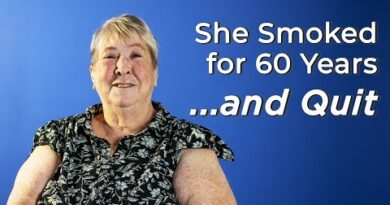CDC: Tips From Former Smokers – Terrie H.s I Wish Tip
In the ongoing effort to educate the public about the dangers of smoking, the Centers for Disease Control and Prevention (CDC) launched a powerful initiative known as “Tips From Former Smokers.” Among the many stories featured, Terrie Hall’s stands out as particularly heart-wrenching and impactful. Terrie, a former smoker from North Carolina, was diagnosed with oral and throat cancer at the age of 40. Her journey with these severe health conditions led her to participate in the CDC’s campaign, through which she shared her poignant narrative to warn others about the risks of smoking.
Terrie’s story is not just a tale of illness but also one of courage and determination. She started smoking in high school and continued for over 20 years before her diagnosis. The consequences for Terrie were severe—over a decade of battling cancer, she endured surgery, radiation, and chemotherapy that left her without her larynx, speaking with the aid of an electrolarynx—a device that helps to produce clearer speech.
Her most compelling message—one that she wished she had understood earlier—is encapsulated in her “I Wish Tip.” Terrie expressed deep regret over ever starting smoking: “I wish I had known how this would affect my life,” a statement from one of her campaign videos. This sentiment is not just about regretting starting smoking but is also a plea for others to learn from her experience.
Terrie hoped that by sharing the harsh realities of what smoking can do—the surgeries, the loss of voice, and overall diminished quality of life—she could inspire at least one person to quit or discourage them from starting in the first place. Her straightforward message underscores not just the well-known risks like lung cancer but also other devastating consequences such as oral cancer and chronic diseases.
The effectiveness of personal stories like Terrie’s lies in their emotional impact—seeing a real person describe their suffering creates a powerful empathetic response. The CDC’s campaign provides these stories so that smokers can see tangible examples of how their future might unfold if they continue on their current path.
Terrie passed away in 2013 after fighting cancer bravely for more than ten years. However, her legacy endures through her participation in this campaign. Her experiences continue to serve as a stark reminder about why prevention is crucial when it comes to smoking-related diseases.
For those looking to quit smoking or struggling with nicotine addiction, there are resources available:
– The CDC offers guidance on quitting smoking including links to helplines.
– Many communities have local support groups and clinics specially tailored for those who need help quitting.
– Health care providers can offer medical aids like nicotine patches or prescriptions that can help ease withdrawal symptoms during cessation attempts.
In conclusion, Terrie Hall’s life story serves as an influential lesson on the dangers associated with tobacco use. It emphasizes not only enduring physical hardships but also facing emotional turmoil—an entire lifestyle overhaul due to preventable habits formed early on. If you or someone you know smokes considering quitting today could be your most important decision—it might just save your life or spare you from severe health issues like those faced by Terrie Hall.


